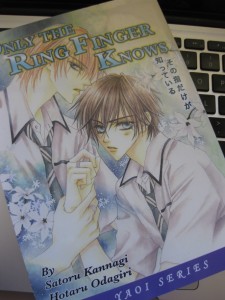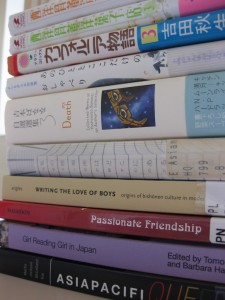These days, there’s a holiday for just about anything, so it shouldn’t be a surprise that there is a dedicated yaoi day. Yaoi, or boys’ love, is also written as 801, hence August 1st, or 8/01, being the obvious date for an international holiday celebrating the love between men as drawn by women. Why 801? In Japanese, the shortened pronunciation of the word for 8 is “ya,” while 0 can be read as “o” (how’s that for a western influence?), and 1 as “i.” Ta-da!
I’ve written a post on boys’ love visual novels before, but since today I’m going to be discussing the manga variety, I thought it’d be worthwhile to go through the terms “yaoi” and “boys’ love,” since I know a lot of my readers aren’t really that familiar with the manga side of things.
Yaoi originated as a term that was largely used to describe dōjinshi, or fan comics that usually parody existing works by “slashing” male characters and depicting them in loving, often explicitly sexual, relationships. When officially-published works started making their way over to the US and other countries, publishers and fans latched on to the term “yaoi” and began to use it to describe any manga that was drawn by a woman for a female audience and depicted male-male relationships.
Boys’ Love, on the other hand, sprouted up in Japan in the late 90s, I believe, and quickly came to be used to describe the genre as a whole. Often abbreviated as BL, it refers to all officially-licensed works that are written by women for women and deal with male homosexual relationships. Since BL has expanded from manga to other forms of media in recent years, this term can be used to describe anything from anime to video games, as well. Even so, yaoi still remains the predominant term to describe the genre outside of Japan.
 |
The first boys’ love manga I ever purchased! Notice how
it’s labeled as a “yaoi series.” (published by Digital Manga
Publishing in 2002) |
I’m sure you’re all wondering why I feel the need to be a party pooper and give a lesson in semantics when I could be posting gay porn, right? (or maybe not…) Well, I figured I’d actually take this opportunity to make it official: I’m doing a PhD on this very topic! Yes, if all goes well, in 3 years, you can all call me Dr. Anne Lee, boys’ love specialist.
I first realized the study of boys’ love (and other manga, by extension) was an actual legitimate academic pursuit when I took a course titled “Homosexualities in Asian Literature and Film” in my freshman year at the University of Massachusetts Amherst. I’d been interested in continuing my Japanese studies to the graduate level since high school (what can I say, I’m a book worm), but the thought of extending a hobby of mine into the academic sphere seemed unthinkable. Little did I know manga studies is its own area of research, and that there was even a manga studies degree being offered at a university in Japan! Boys’ love studies, too, has been growing in popularity in recent years, with scholars looking at everything from why women like to read narratives that appear to exclude them to how boys’ love acts as a feminist forum!
So on this 801 Day, I wanted to take a little time to reflect on how far I’ve come, and encourage everyone out there who’s ever though their interest was too weird or niche not to give up hope. It may sound a little cheesy, but it’s true! I’m just at the start of my degree, and it’s a whole lot of work, but it’s all worth it. Plus, I get to buy all sorts of awesome books in the name of research!
 |
A sampling of the books on my desk right now.
Death is a collection of short stories by Banana Yoshimoto,
and the top two manga volumes are actually Antique Bakery
by Fumi Yoshinaga |
So thank you, 801! Without you, I wouldn’t be where I am today! Yaoi banzai!
And a big thanks to @ladyriven for whipping up such an awesome banner!